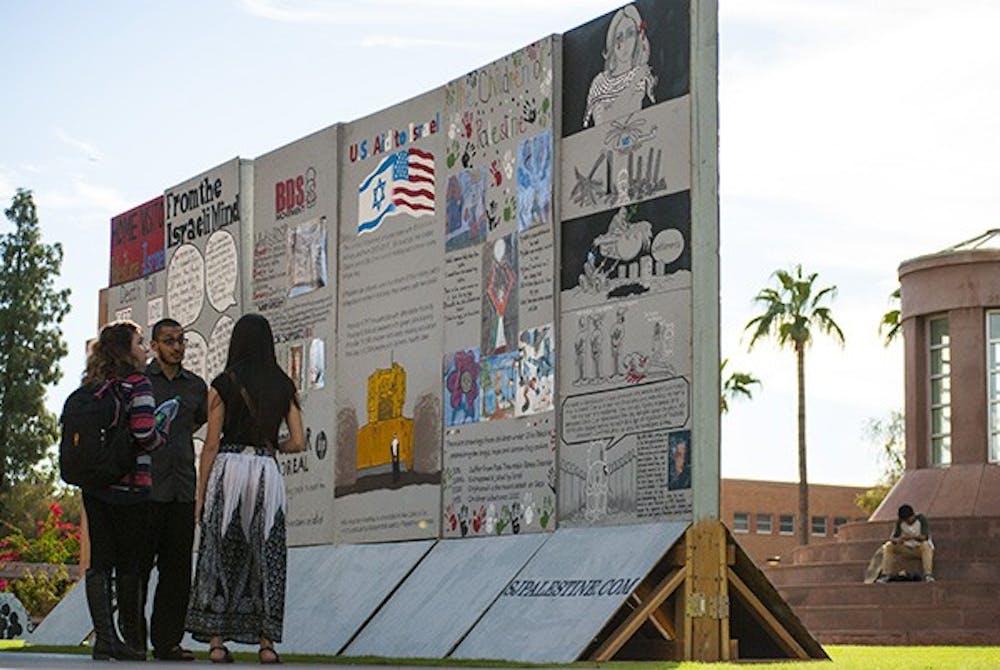
Ph.D student Zohair Zaidi talks with global studies freshman Alicia Nelson about the Palestinian apartheid wall constructed on Hayden Lawn. Zohair is the cofounder of Students for Justice in Palestine at ASU, who constructed the wall to raise awareness about the issues in Palestine. (Photo by Murphy Bannerman)
Students may have noticed a wall standing on Hayden Lawn on the Tempe campus Monday and Tuesday depicting visuals and statistics meant to inform passers-by about the Israeli-Palestinian conflict.
The mock wall, put together by the pro-Palestinian student group Students for Justice in Palestine, is meant to represent the wall that divides Israel and the West Bank.
Global politics junior Omar Halawa said he compares the conflict between the Israelis and the Palestinians to the apartheid in South Africa.
“I think the issue is very similar to the apartheid,” he said. “It’s the same kind of system.”
The analogy compares Israel’s treatment of the Palestinians to South Africa’s treatment of non-whites during the apartheid era.
SJP's goal is to educate the community about the injustices happening to Palestinians in Israel.
Halawa joined SJP last year and said he is passionate about the cause. On Tuesday, he volunteered to give tours of the wall to students with questions.
The wall also contains graphic photos of Palestinian victims.
“I am not a big fan of the graphic photos,” Halawa said. “But they do get the message across of where we are coming from."
Halawa said although Israel is a democratic state, there is still segregation.
“In parts of Israel, Palestinians can’t drive on the roads or even ride the same bus as Israeli citizens,” he said. “There are checkpoints adjacent to segregated roads.”
The wall emphasized that there is a difference between Judaism and Zionism.
“We have no issue with the Jewish faith,” Halawa said. “We are anti-Zionism, but Zionism does not mean Judaism.”
Judaism and Zionism are generally not used interchangeably. Judaism has more to do with faith while Zionism is a political ideology that refers to the idea that Jewish people have rightful possession of Israel.
Halawa said his grandparents were displaced from their homes in Palestine in 1948.
“They aren’t allowed to go back to Palestine,” he said. “There are some Palestinian refugees who still have the keys to their old houses, waiting to return home some day.”
Halawa said before 1936, Palestinians and Israelis lived peacefully together and practiced different faiths on the same land. Now, Palestinians are very passionate about someday returning to their land.
“The wall is a death penalty for them,” he said. “Ninety percent of the land in Jerusalem has been lost because of the wall.”
One of the images on the wall shows a cartoon of a child with his hands behind his back with text that says, “I will not grow up until my homeland is free.” This political cartoon is named Handala, an iconic symbol to the Palestinians.
Halawa said the wall has received a generally positive response.
“The purpose of this wall is to get the message across to people who don’t know what’s going on,” he said. “There are some people who don’t know the difference between Palestinians and Israelis.”
Business sustainability senior and member of Sun Devils for Israel Samantha Weinberg said she has been to Israel and has seen that it is democratic and diverse.
“If you’ve ever been to Israel, it’s obviously not apartheid,” she said. “The so-called apartheid wall is actually a security barrier to protect innocent civilians from suicide bombers.”
Weinberg said she doesn’t find the wall offensive.
“It’s completely a one-sided view,” she said. “The conflict is very complex. If it weren’t so complex, there would already be a solution by now.”
Biochemical engineering sophomore Emad Khazan said he has been involved with the Israeli-Palestinian conflict his entire life.
“Before I was born my parents were Palestinian refugees,” he said.
Khazan said he joined SJP so he could get an objective view on the issue.
“A lot of people argue about the issues happening but don’t know the facts,” he said.
Biomedical engineering junior Aman Aberra said SJP’s goal is to gain a visible presence on campus.
“We are also working on the BDS movement,” he said. “We want to pressure the administration to stop investing in Caterpillar, which gives vehicles to the Israeli army that demolishes Palestinian homes.”
The Boycott, Divestments and Sanctions campaign focuses on putting pressure on Israel to comply with a set of goals the movement has established.
Aberra said SJP will be participating in a round table discussion on Friday. The discussion will mainly cover the Middle East, but it will also touch on the conflict between Israel and Palestine.
“We want to discuss different opinions as well as raise awareness,” he said.
Reach the reporter at kgrega@asu.edu or follow her on Twitter @kelciegrega




